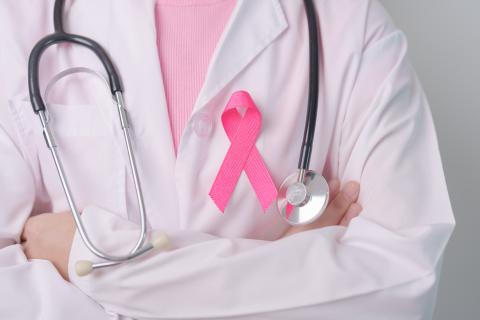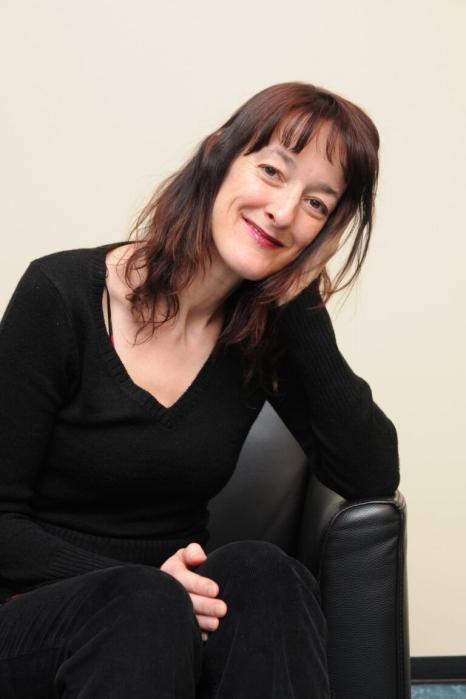
Suzette Delaloge: a pioneer in personalised breast cancer prevention
Suzette Delaloge, an alumnus of the Faculty of Medicine of Université Paris-Saclay, is an internationally renowned medical oncologist specialising in breast cancer. She leads the Interception programme at Gustave Roussy, an innovative initiative dedicated to the prevention and early detection of cancers in high-risk individuals.
Suzette Delaloge's passion for research and oncology dates back to the start of her studies at Université Paris-Saclay (formerly Université Paris-Sud) at the age of 17. After earning her PhD in medicine specialising in medical oncology in 1997, she turned her attention to breast cancer research. Her thesis work concentrated on the efficacy of retinoic acid as an adjuvant treatment, an avenue which, although inconclusive, paved the way for further research.
In 1993, she spent a year at the University of Ottawa in Canada, studying the role of retinoic acid receptor alpha in lung cancer. Upon returning to France, she became involved in the study of constitutional genetics and genomics, obtaining a 2nd year Master’s degree in this field. This furthered her understanding of the molecular mechanisms involved in cancer development.
A career at Gustave Roussy: from the clinic to post-graduate teaching
In 1999, Suzette Delaloge joined Gustave Roussy, one of Europe's largest cancer treatment centres. She began as a specialist practitioner and quickly became Head of the Breast Cancer Department (senology) in 2003. Her clinical expertise and deep understanding of the disease enabled her to offer innovative, personalised care to her patients.
However, Suzette Delaloge's contributions extended beyond patient care. She continued to conduct cutting-edge research in cancer genetics and genomics, exploring in particular the role of biomarkers in the diagnosis and treatment of breast cancer. "I've worked extensively with real-life data, implementing artificial intelligence protocols for data exploitation," she notes. She also took an interest in healthcare organisation and, in 2004, set up a rapid diagnostic clinic for breast lesions, a model that has been adopted in France and abroad. In addition, she has been involved in post-graduate teaching, notably through the institutional degree (DU) in Clinical Carcinology at the School of Cancer Sciences. At this university institution that specialises in oncology and is attached to the Faculty of Medicine of Université Paris-Saclay and Gustave Roussy, she imparts her passion and knowledge to future oncologists.
A leading figure in breast cancer research and the Interception programme
Over the years, Suzette Delaloge has become a leading figure in breast cancer research. She has been the principal investigator or coordinator of countless national and international clinical trials, which are advancing the treatment of this disease. Her work focuses in particular on precision medicine, which aims to tailor treatments to the genetic and molecular characteristics of each tumour. "I'm convinced that the future of the fight against cancer lies in personalised prevention and early detection," she asserts. In line with this, in 2021, Suzette Delaloge took the helm of the Interception programme, an ambitious project designed to revolutionise cancer prevention and early detection through a comprehensive, personalised approach.
The originality of the Interception programme lies in its cross-disciplinary and multidisciplinary nature. It brings together specialists from various fields such as oncology, biology, nutrition, psychology and artificial intelligence. They work together to offer high-risk individuals a personalised care pathway that includes specialised consultations, state-of-the-art tests, therapeutic education workshops and regular follow-ups. "High-risk patients are defined as those whose risk of developing a specific cancer is greater than 2.5%, a threshold that may be raised in the future. This includes people with a genetic predisposition, family history, precancerous lesions or exposure to environmental risk factors."
Cutting-edge research for a new vision of prevention
The Interception programme is also a research laboratory. The researcher and her team are working on several key areas: identifying new biomarkers for early detection of cancers, developing drugs and vaccines to block their development and creating new, more accurate and less invasive screening tests. "The goal is to identify individuals with a high risk of developing cancer five years before the onset of the disease and to implement interventions to prevent its development or detect it at a very early stage." One of the promising current projects is the study of salivary DNA methylation for the early detection of breast cancer.
To accomplish these research goals, Suzette Delaloge works with an extensive network of partners in France and abroad. She has established a European consortium for personalised breast cancer prevention and screening, and is leading a major international study, MyPeBS, involving over 53,000 women, to assess the effectiveness of a personalised screening strategy.
The Interception programme is currently being deployed nationwide and has generated significant international interest. "With nearly 2,000 individuals already benefiting from this programme at Gustave Roussy, and a national target of 4,000 to 5,000 people a year, Interception embodies a new vision of cancer prevention and early detection that could significantly change the landscape in the coming years."
National and international recognition
Suzette Delaloge's work has been honoured with numerous awards, including the prevention prize from L'Express in 2023 and the Legion of Honor in 2019. As the author of over 350 scientific publications, she frequently speaks at international conferences. She chaired the National French Cooperative Breast Cancer Intergroup within Unicancer from 2015 to 2019 and led the European Society for Medical Oncology (ESMO) Breast conference, Europe's foremost breast cancer conference. Her expertise is internationally recognised, as evidenced by her role as an associate editor for several scientific journals. "I am honoured by these distinctions and responsibilities, which represent recognition of my work and commitment in the fight against cancer. More importantly, they provide an opportunity to make further advancements in cancer research and prevention."

